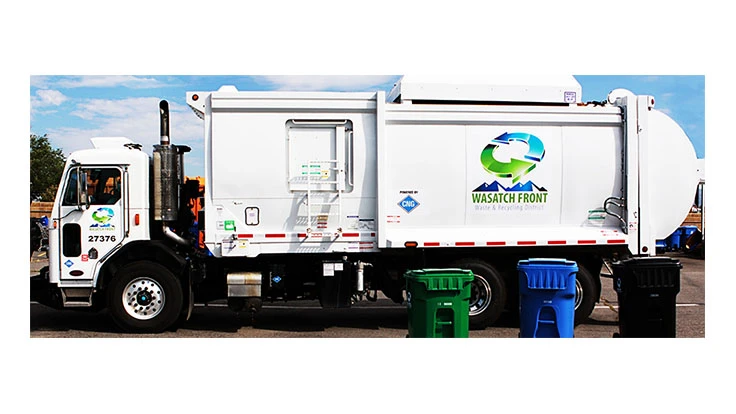
Utah’s Wasatch Front Waste & Recycling District (WFWRD), which oversees waste and recycling collection services to about seven cities in the state, has completed the conversion of its entire fleet of residential collection trucks from using diesel fuel to compressed natural gas (CNG).
The conversion process has been a five-year transition and involved 46 residential collection trucks, both front- loading and side-loading vehicles. The conversion project was completed this past August.
The district’s service area in Utah includes Copperton, Emigration, Kearns, Magna and White City Metro Townships; the cities of Cottonwood Heights, Herriman, Holladay, Millcreek, Taylorsville, and portions of Murray and Sandy; and the unincorporated areas of Salt Lake County.
“We service over 82,000 homes every week. This equates to over 1.3 million miles every year,” says Mike Allan, WFWRD deputy director over operations. “By using CNG vehicles, we can dramatically reduce the negative impact to our environment.”
Wasatch Front Waste & Recycling District provides weekly recycling collection services to 200,000 residents in the area.
According to Natural Gas Vehicles of America, CNG vehicles emit 20-29 percent fewer greenhouse gas emissions than comparable gasoline or diesel-fueled vehicles. This means that on an annual basis WFWRD is saving about 4,000 tons of carbon dioxide pollution by using CNG fuel.
Switching to CNG vehicles also works from a financial aspect, says Craig Tischner, Herriman City Councilman and current chair for WFWRD’s Administrative Control Board.
“We are committed to being accountable to our community to provide collection services in a healthy and safe manner. This inspired the District to move to an entirely CNG fleet for its collection vehicles. The past two years have shown a savings of approximately $780,000 in fuel costs since we started using CNG trucks. CNG fuel is less expensive than diesel fuel,” he says.
Pam Roberts, WFWRD executive director, says the replenishment program began in 2011 with the purchase of three collection vehicles. While the first generation of vehicles the District purchased did not have the engine size the district was looking for, since then the CNG-powered vehicles have all met the engine requirements the district was seeking.
Sponsored Content
Labor that Works
With 25 years of experience, Leadpoint delivers cost-effective workforce solutions tailored to your needs. We handle the recruiting, hiring, training, and onboarding to deliver stable, productive, and safety-focused teams. Our commitment to safety and quality ensures peace of mind with a reliable workforce that helps you achieve your goals.
Further, Roberts notes that while the cost of the CNG vehicles is around $30,000 more than a conventional diesel truck, the difference in fuel prices more than makes up for the difference between the CNG vehicles and diesel vehicle.
Roberts estimates that it makes up the cost difference in about three years.
Latest from Recycling Today
- Steel Dynamics cites favorable conditions in Q1
- Hydro starts up construction in Spain
- Green Cubes unveils forklift battery line
- Rebar association points to trade turmoil
- LumiCup offers single-use plastic alternative
- European project yields recycled-content ABS
- ICM to host colocated events in Shanghai
- Astera runs into NIMBY concerns in Colorado








